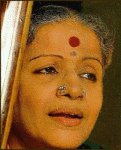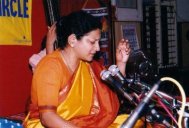 |
  |
 |
  |
A tribute to M S Subbulakshmi - Kala Ramesh, Pune e-mail: nonesuch@vsnl.net January 23, 2005  A Namavali to MS MS stood for Music and Soul These two aksharas ruled the Carnatic world for decades and will live on in people's memory as long as Indian music lives. Kshara means impermanent as against Akshara, which means eternal, nithya. To give that quality of permanence to a letter is nothing short of a miracle, for any 'shabda' vanishes the minute you give voice to it. How did MS make her name and her music stand the test of these many decades? Sri. Dilip Dhonde [project coordinator of Santkavi Tukaram website] had beautifully pointed out that both Gandhiji and MS had one thing in common. For both of them, each individual was important and it did not matter whether he was rich or poor. Gandhiji made it a point to reply to each letter he received while MS saw to it that each rasika returned satisfied after her recital. MS will be remembered for various reasons. For her compassion, for all the remuneration that she received she gave it away for charity even before she reached home. We can say that - Her art was enveloped by her heart. Thirukural talks of compassion: What use is a raga that cannot be sung? Or eyes without sympathy? MS will live in our hearts for her sincerity to her music and its demands. At the age of 73 MS had said in a magazine, "Music is an ocean and I am a student. For a vocalist, voice practice is important. It has been my habit to learn the meaning of the songs I have to sing and the correct pronunciation." My mother, a great admirer of MS, will never tire of telling us how each year that one special song in the end [tukadas] that she sang in the Music Academy, during the December Music Season would be a masterpiece, which would be remembered and talked about until the next season! MS stands unparalleled in her bhakti and devotion. Everyone talks of the bhakti in her songs. Maybe it was the presence of the veiled shringara rasa transformed into bhakti in her music, which had captured people's heart? In Sant Meera, it was sheer undiluted love, which ripened to bhakti and MS being a keen observer learnt how to churn her rasa laden music into a prayer. She did it most effectively and naturally. Her rendering of the Meera bhajan "mhane chakar rakho ji," stands testimony to this fact. She has sung each word with so much vitality and sincerity that it brought tears even to the eyes of the western director Ellis R Dungan. Even now a person seeing that movie for the first time will be moved to tears seeing that intense emotion and love for her beloved. The renowned Lata Mangeshkar has said that she liked MS's way of singing so much that she saw the film Bhakta Meera 50 times, modeling her singing after MS. MS will be cherished for her old world charm and beauty. In Chennai, during Deepavali, the weavers of Kanjeevaram sarees will bring out a 'new' colour every year. That colour would rule that season. But 'MS blue' was a rage for many years over ruling even the Deepavali season frenzy! She had become a household name. I remember listening to her live concert for the first time. When I came home, all that was vivid in my mind were her sparkling diamond nose studs and her smile. She was beautiful. We will ever be indebted to MS for being an ambassador for Carnatic sangeeth. She was responsible for taking Carnatic music overseas. From the Himalayas to Kanyakumari her stotras resonated in the morning skies. Her singing in the Carnegie Hall or at the United Nations, her being the first woman to receive the Bharat Ratna made us swell with pride. MS was woman personified. According to Manu, the Hindu marriage contemplates identity, and not equality, for both man and woman. The primary motive of marriage is not merely individual satisfaction, but the achievement of Purushartha, the purposes of life. She did that so effortlessly, that her husband's children and his family became her own. In 1997, on her husband's death she stopped singing. She pined for him and her health deteriorated till she passed away on 11th December 04, leaving behind her voice in the records, her smile in our memory, her wealth in the hands of the needy and her 'bani' for the coming generations to admire and emulate. This article was first published on the website of veena, Indian Arts Review  The writer had her initial training in Carnatic Veena and later switched over to Hindustani vocal. She has made a concerted effort to understand the 'spirit' behind Pt Kumar Gandharava's gayaki, along with paramparic compositions of Gwalior Gharana under the guidance of Vidushi Shubhada Chirmulay, Pune. |